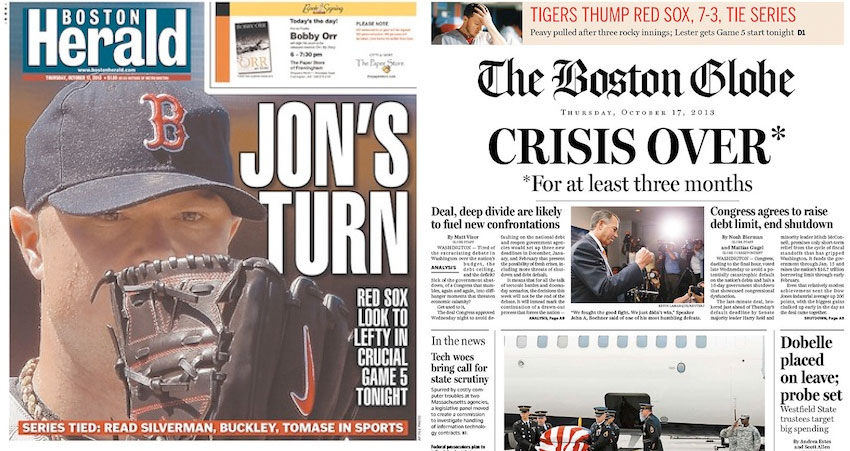Did the Boston Herald Notice that the Shutdown Is Over?
The editors of the Boston Herald and the Boston Globe seemed to have a difference of opinion on the import of a deal to end the government shutdown and avert a debt ceiling crisis. Look at their front pages in print this morning, courtesy of the Newseum:
The Globe has a rather fun headline about the fleeting nature of the compromise. The Herald, meanwhile, not only doesn’t mention a deal on its front page, its print edition doesn’t have a story about it at all. It only mentions that a deal has been reached in a business story about how frequent government crises are bad for consumer confidence.
Hey, maybe the Herald simply couldn’t rework the paper in time to get the late-breaking news into the early editions. But look, too, at the newspapers’ home pages at about 10 a.m. Thursday:
The government shutdown dominates the top of the Globe’s homepage. Meanwhile, on the Herald site, you have to scroll down to find an Associated Press story (not pictured in the above screenshot) about the resolution. Michael Graham’s tale of woe about a gas station employee who was fired for defending himself against a knife-wielding robber with his personal gun takes the dominant place on the homepage.
Not to read too much into the Herald‘s intentions, but if the strategy here is to downplay a crisis that has hurt the Republican party’s reputation, it seems like a foolhardy one. At the outset of the government shutdown, Howie Carr took the stance, popular on the right, that no one would notice the absence of intrusive government on their lives. While the sky didn’t literally fall, people did notice. Everyone in Washington took a hit in their favorability polling, but no one took a larger hit than Republicans. (And that’s to say nothing of the estimated $24 billion hit the economy took because of lost productivity over the past few weeks.) So who could blame the Herald for serving up the more palatable news its readers might enjoy?
Well, as conservative media’s critics often complain, right-leaning outlets are putting their own readers at an information disadvantage. The government shutdown was a bad strategy and Tea Party Republicans didn’t get what they wanted out of it. But only those willing to scroll to the bottom of the Boston Herald homepage are going to contend with those facts in the pages of the Herald. (The Associated Press story they run doesn’t mince words, calling it “a last-ditch effort to derail the president’s landmark health care law,” and noting, “The shutdown sent GOP approval ratings numbers reeling in public opinion polls.”)
There’s no better way for the conservative movement to avoid these kind of hits to its reputation and the economy’s productivity than to contend fully with bad strategies when they fail rather than bury a wire story deep down on the homepage. As Joshua Green writes in Bloomberg Businessweek this morning, we’re not likely to see an end to this era of lurching from crisis to crisis, in part because Congress’s deepening partisan divide shows no signs of abating. Ignoring it won’t help.



